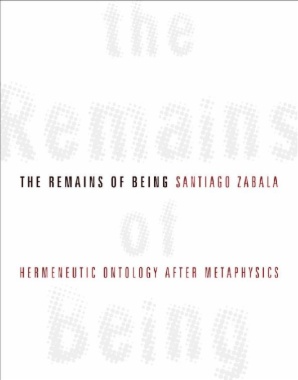In Basic Concepts, Heidegger claims that "Being is the most worn-out" and yet also that Being "remains constantly available." Santiago Zabala radicalizes the consequences of these little known but significant affirmations. Revisiting the work of Jacques Derrida, Reiner Schürmann, Jean-Luc Nancy, Hans-Georg Gadamer, Ernst Tugendhat, and Gianni Vattimo, he finds these remains of Being within which ontological thought can still operate.
Being is an event, Zabala argues, a kind of generosity and gift that generates astonishment in those who experience it. This sense of wonder has fueled questions of meaning for centuries-from Plato to the present day. Postmetaphysical accounts of Being, as exemplified by the thinkers of Zabala's analysis, as well as by Nietzsche, Dewey, and others he encounters, don't abandon Being. Rather, they reject rigid, determined modes of essentialist thought in favor of more fluid, malleable, and adaptable conceptions, redefining the pursuit and meaning of philosophy itself.
- Contents
- Preface xi
- Acknowledgments xvii
- Introduction 1
- 1 Being Destroyed: Heidegger's Destruction of Being As Presence 25
- §1. Retrieving the Meaning of Being 29
- §2. Questioning the “Worn-Out” Being 41
- 2 After the Destruction: The Remains of Being 53
- §3. Schürmann’s Traits of Economical Anarchies 58
- §4. Derrida’s Treasures of Traces 66
- §5. Nancy’s Copresences of Singular Plurals 72
- §6. Gadamer’s Conversations of Language 78
- §7. Tugendhat’s Meanings of Sentences 86
- §8. Vattimo’s Events of Weakness 92
- 3 Generating Being Through Interpretation: The Hermeneutic Ontology of Remnants 99
- §9. Logics of Discursive Continuities 104
- §10. Generating Being “from Within” 111
- Notes 121
- Bibliography 151
- Index 171

